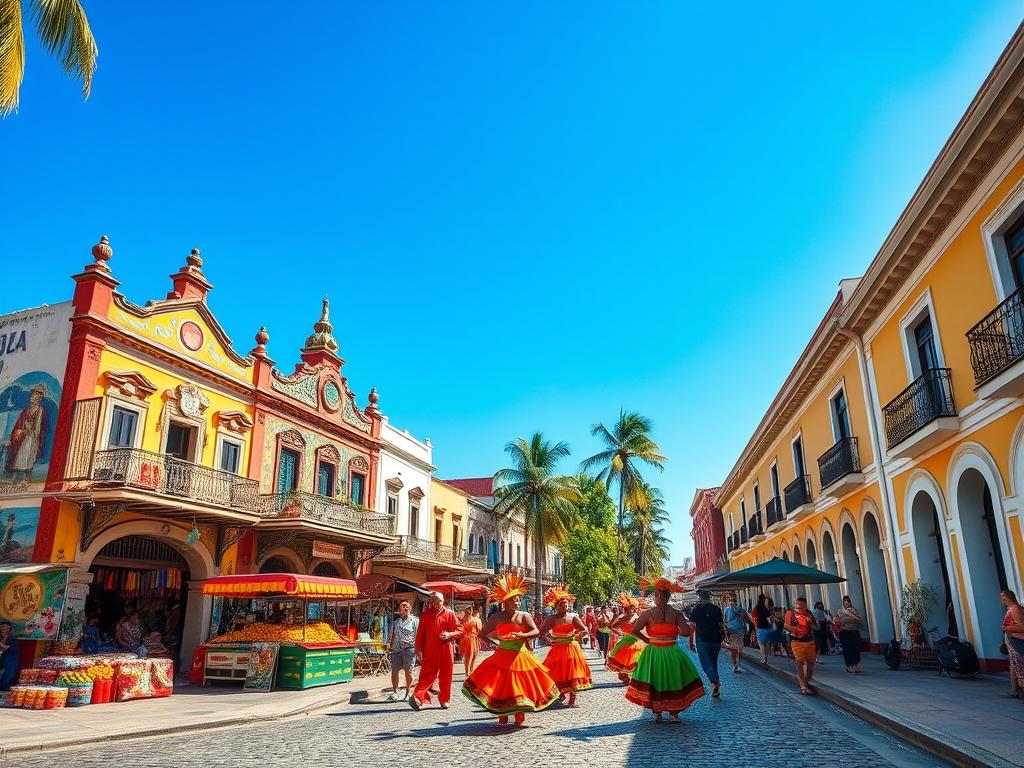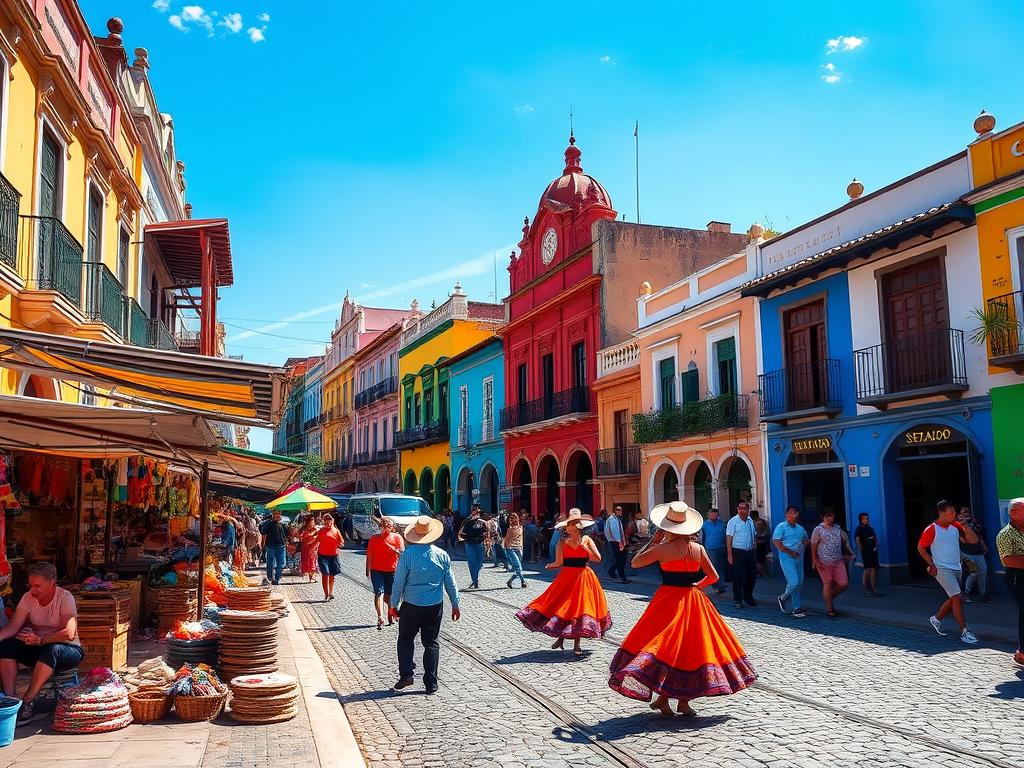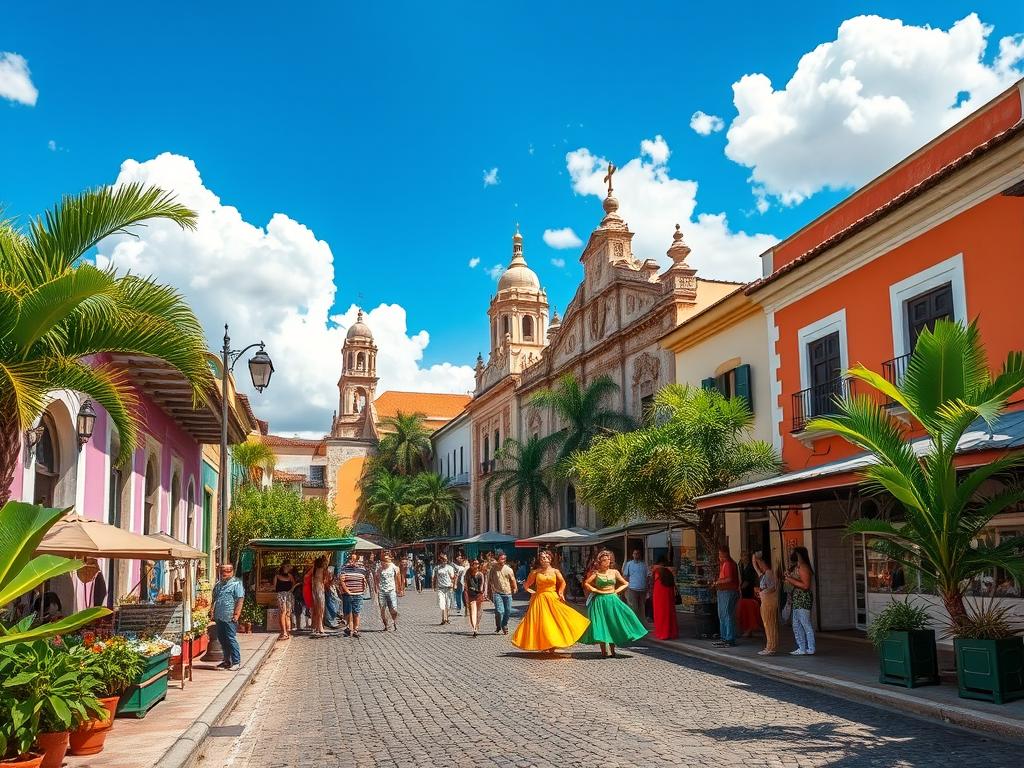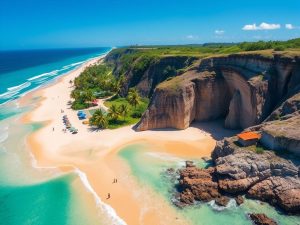
Salvador is a vibrant city on Brazil’s northeastern coast. It’s the cultural heart of Bahia, known for its rich history and diverse heritage. Founded in 1549, it was the first capital of colonial Brazil.
Salvador’s design shows its complex past. The upper city was for defense and politics, while the lower city was for commerce and ports. This is seen in its buildings, where old colonial structures meet lively markets and plazas.
The city’s history is tied to the transatlantic slave trade. Many Africans were brought here to work on sugar cane plantations. This dark history has shaped Salvador’s music, dance, food, and religion, making it a global symbol of Afro-Brazilian culture.
Introduction to Salvador: Brazil’s Vibrant Cultural Capital
Salvador, the capital of Bahia, is known as Brazil’s cultural capital. It has a rich history and multicultural heritage that makes it stand out. Founded in 1549, it was Brazil’s first capital for nearly 200 years. This made it a center of politics, economy, and culture.
Historical Significance and Multicultural Heritage
Salvador’s people come from African, European, and Indigenous backgrounds. This diversity shines in its culture. The city’s historical significance and multicultural heritage are seen in its colonial buildings, lively plazas, and famous religious sites.
Bahian Music, Dance, and Cuisine as Expressions of Diversity
Salvador’s culture is alive with samba and axé rhythms and colorful dishes like moqueca and acarajé. The city’s Bahian music, dance, and cuisine show its diverse and lively culture.

“Salvador is distinguished by its colonial architecture and historical landmarks, such as the Pelourinho, the first capital of Brazil, which is a major draw.”
Salvador is known for its stunning beaches, vibrant Carnival celebrations, and rich Afro-Brazilian traditions. It’s a unique and captivating place that lets visitors see the heart of Bahian culture and history.
Exploring the Historic Pelourinho District
In the heart of Salvador, the Pelourinho district is a UNESCO World Heritage Site. It shows off the city’s Renaissance colonial architecture and rich cultural heritage. Walking through the colorful cobblestone streets and lively plazas feels like stepping back in time.
Beautifully preserved buildings, churches, and monuments reflect the city’s Portuguese and Afro-Brazilian roots.
Renaissance Colonial Architecture and UNESCO World Heritage Site
The Pelourinho district is home to architectural wonders like the Igreja de São Francisco, a Baroque masterpiece. The Elevador Lacerda, the world’s first urban public elevator, offers stunning views of the city. The district’s architecture, starting in the mid-17th century, blends Renaissance and Baroque styles beautifully.
Pelourinho’s historic center was named a UNESCO World Heritage Site in 1985. It’s known for its cultural and architectural importance. The district has buildings from the 16th to the 19th centuries, showcasing religious, civil, and military structures that have been well-preserved.
Colorful Cobblestone Streets and Lively Plazas
Exploring the pelourinho district salvador reveals a vibrant atmosphere. The salvador cobblestone streets and lively plazas are filled with music, dance, and local crafts. The salvador renaissance colonial architecture adds to the city’s cultural scene.
Places like the Municipal Square, Terreiro de Jesus, and Pelourinho Square show the area’s colonial heritage. Their well-preserved buildings and monuments highlight the city’s rich history and diversity.

“Pelourinho is a captivating blend of history, art, and contemporary life, with a bustling atmosphere of music, dance, and local artisanal crafts.”
Salvador’s Iconic Religious Landmarks
Salvador, the vibrant cultural capital of Brazil, is filled with impressive religious landmarks. The Igreja de São Francisco is a standout Baroque masterpiece.
Igreja de São Francisco: A Baroque Masterpiece
The Igreja de São Francisco was built between the 17th and 18th centuries. It’s a stunning example of salvador baroque architecture. Inside, you’ll find intricate woodcarvings, gilded altars, and beautiful azulejo tiles.
These elements mix European and African influences, shaping Bahian culture. Visitors to salvador religious landmarks are amazed by this grand Baroque church. It symbolizes the city’s spiritual and artistic traditions.
“The Igreja de São Francisco is a singular expression of Brazilian Baroque architecture, a true masterpiece that leaves visitors in awe of its splendor and attention to detail.”
Exploring Salvador’s historic streets, the Igreja de São Francisco is a must-see. It showcases the city’s spiritual and artistic legacy. This Baroque landmark invites you to experience the unique blend of European and African influences in Salvador’s vibrant culture.
Afro-Brazilian Influences and Traditions
Salvador, the vibrant capital of Bahia, shows the deep impact of Afro-Brazilian culture. This rich mix of traditions is seen everywhere in the city. From the rhythmic beats of capoeira to the spiritual practices of Candomblé.
Candomblé: The African-Rooted Religion
At the heart of Salvador’s Afro-Brazilian identity is Candomblé. This ancient religion comes from West Africa. In the sacred terreiros, or temples, devotees perform rituals that blend song, dance, and percussion.
They honor the orixás, or deities, that are key to Bahian culture.
Capoeira: The Martial Art and Cultural Expression
Capoeira started as a way for enslaved Africans to resist and survive. Now, it’s a symbol of Afro-Brazilian identity and empowerment. It’s a mix of dance, acrobatics, and combat.
Practitioners show off their skills in vibrant performances all over Salvador.
The Afro-Brazilian influence in Salvador shows the city’s rich history and strong spirit. From capoeira’s rhythms to Candomblé’s spiritual energy, these traditions shape the city’s cultural identity. They invite visitors to dive into Bahian heritage.
“The Afro-Brazilian influence is not just a part of Salvador’s history, but a living, breathing embodiment of the city’s resilience and cultural identity.”
Discovering Salvador: The Heart of Bahian Culture and History
Salvador, the captivating capital of Bahia, is known as the heart of Bahian culture and history. It’s a city full of vibrant Afro-Brazilian traditions and iconic landmarks. Salvador offers a deep dive into the essence of Brazil’s northeastern region.
The city’s historic districts, like the UNESCO-listed Pelourinho, show the architectural and cultural influences that have shaped Bahia. Its lively music, dance, and cuisine scenes give a dynamic and immersive experience of the region’s distinctive character. Discovering Salvador means uncovering the diverse threads that have woven together to create the captivating tapestry of Bahian identity.
Salvador, the third-largest city in Brazil with over 3 million inhabitants, is a mosaic of cultures, histories, and traditions. Past meets present, and ancestral traditions are passionately celebrated. The city’s indelible marks of its past can be seen through its cobbled streets, colonial houses, and Baroque churches.
From the Mercado Modelo, the largest handcraft center in Bahia with 263 shops dating back to 1912, to the over 370 churches that dot the city’s landscape, Salvador’s cultural mix fascinates. The city’s Afro-Brazilian traditions, such as Capoeira and Candomblé, showcase the region’s unique identity and its resistance and freedom.
Salvador’s captivating rhythm is fueled by the effervescent music of samba, reggae, and axé. This creates an unforgettable experience for visitors. The city’s Bahian cuisine also tantalizes the senses, with local dishes like moqueca and acarajé reflecting generations of artisanal skills.
Whether exploring the heavenly beaches lined with coconut palms and turquoise waters, or immersing yourself in the vibrant cultural landmarks and the unique carnival experience, discovering Salvador is a truly captivating journey into the heart of Bahian culture and history.
Beaches and Natural Wonders
Salvador, in Brazil’s Bahia region, is a city where culture meets nature. Salvador’s beaches are lined with coconut palms and have turquoise waters. They are great for swimming, sunbathing, and enjoying the Brazilian lifestyle.
Ilha de Itaparica, a short ferry ride away, is a tropical paradise. It has lush landscapes and a calm village vibe. Visitors can see historical sites, relax on salvador beaches, and dive into local culture. It’s a favorite spot for those looking to escape Salvador’s busy streets.
Heavenly Coastlines and Turquoise Waters
Salvador boasts over 50 kilometers of salvador coastline. It’s a paradise for beach lovers and sun seekers. From Praia do Farol da Barra to Praia de Itapuã, there’s a beach for everyone.
- Enjoy the clear waters and golden sands of Praia do Porto da Barra
- See the cliffs and lush greenery of Praia do Flamengo
- Relax at Praia de Amaralina, known for its lively beach vibe
Ilha de Itaparica: A Tropical Haven
The Ilha de Itaparica is a peaceful getaway from Salvador. This tropical island has stunning salvador natural wonders. You’ll find pristine beaches, quiet villages, and a rich culture.
- Visit the Igreja de Nossa Senhora da Conceição
- Relax on Praia de Bom Despacho and Praia do Amoreiras
- Explore quaint fishing villages and try the local food
“Salvador’s beaches are a true testament to the natural beauty of Brazil’s Bahia region, offering a perfect blend of turquoise waters, golden sands, and lush tropical landscapes.”
Culinary Delights and Street Food
Salvador’s food scene is a vibrant mix of salvador cuisine and salvador street food. It reflects the city’s rich cultural heritage. Bahian cuisine stands out, blending African, Indigenous, and European flavors.
Dishes like moqueca and acarajé are must-try foods. They show the city’s culinary traditions. The streets of Salvador are filled with the smells and sounds of food vendors.
Moqueca, Acarajé, and Other Bahian Specialties
Salvador offers a wide range of salvador cuisine and salvador street food. You can try moqueca, a seafood stew, and acarajé, a fried bean fritter. These dishes celebrate the city’s diverse culture.
Other Bahian treats include cocada and vatapá. They highlight the city’s culinary traditions. The streets of Salvador are full of food vendors, offering a taste of the city’s vibrant culture.
“The streets of Salvador come alive with the tantalizing aromas and lively atmosphere of local food vendors, offering an immersive taste of the city’s dynamic culture and the culinary traditions that have become integral to Bahian identity.”
Carnival in Salvador: A Celebration of Life
Salvador’s carnival is a vibrant explosion of color, sound, and energy. It turns the city into a living, breathing canvas of Afro-Brazilian culture. This celebration is more than just a parade; it’s a deep dive into the region’s musical heritage.
The streets become a stage for frenetic dancing and spellbinding performances. The city’s diverse population comes together to celebrate their shared identity. Salvador’s carnival shows the resilience and joy at the heart of this captivating destination.
According to the Guinness World Records, Salvador’s Carnival is the world’s largest street party. It attracts millions of travelers every February. The city’s iconic “trios elétricos” lead dancers and crowds through historic neighborhoods, showcasing the city’s rich cultural heritage.
- Ilê Aiyê is the first Afro bloco in Salvador, celebrating Afro-Brazilian identity and traditions.
- The “Filhos de Gandhy” group, founded in 1949, parades in white robes promoting messages of peace and brotherhood inspired by Mahatma Gandhi.
- Carlinhos Brown’s Pracatum Social Project empowers youth in Salvador through music and education.
The Afro-Brazilian Museum in Salvador offers insights into the city’s African heritage. The city’s Pelourinho, a UNESCO World Heritage Site, showcases its rich colonial history. Salvador’s vibrant cuisine reflects the city’s cultural diversity, with dishes like acarajé and moqueca.
“Salvador’s Carnival celebrates diversity and inclusion, showcasing Afro-Brazilian traditions and LGBTQ+ pride.”
At the heart of Salvador’s carnival lies a profound celebration of life. It’s a testament to the resilience and joy of the city’s Afro-Brazilian communities. As visitors immerse themselves in the vibrant rhythms and celebrations, they gain a deeper understanding of Salvador’s rich cultural tapestry.
Conclusion
Salvador, the capital of Bahia, is a city that grabs your heart with its rich culture, landmarks, and natural beauty. The historic Pelourinho district and its stunning colonial buildings are a sight to behold. The Afro-Brazilian traditions that fill the city make it a true experience of Brazil’s northeastern region.
The city’s food, music, and dance scenes are lively and engaging. The annual carnival celebration is a highlight, making Salvador the heart of Bahian culture and history.
Exploring Salvador’s religious sites, coastlines, and lively streets is an adventure. Salvador invites you to discover its diverse culture. From Afro-Brazilian traditions to the UNESCO-designated Pelourinho district, it showcases Brazil’s rich heritage.
This city is a unique chance to experience Bahian life. It’s a place where history, culture, and nature come together beautifully.
As we wrap up, Salvador is a top spot for exploring Brazil’s northeastern region. It offers a mix of history, culture, and natural wonders. Travelers can dive into the city’s sights, sounds, and tastes, making Salvador the cultural capital of Bahia.

